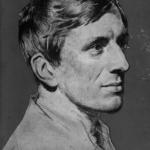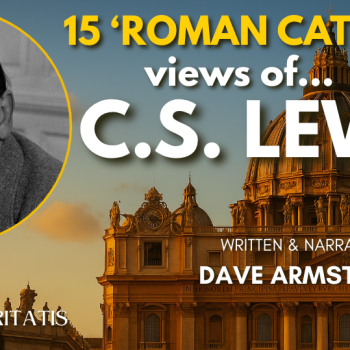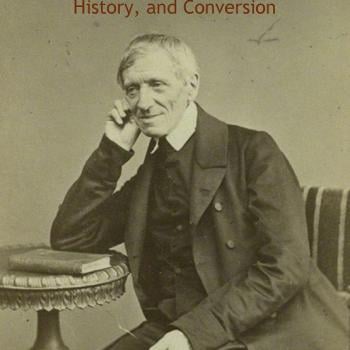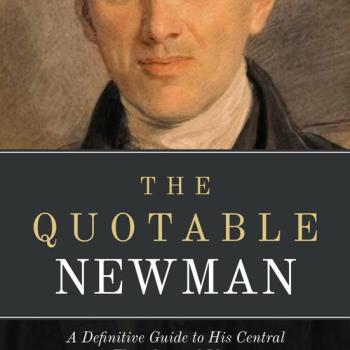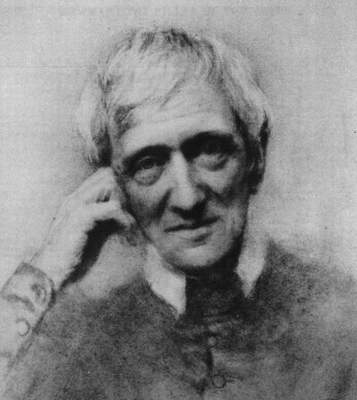
Blessed [soon-to-be-saint] John Henry Cardinal Newman (1801-1890) was a (if not the) leading figure in the Church of England prior to his conversion to Catholicism in 1845; a scholar at Oxford who possessed brilliant speaking and writing abilities. His Parochial and Plain Sermons (1834-42), are considered by many the best sermons in the English language, and had “a profound influence on the religious life not only of Oxford but of the whole country” [F. L. Cross & E.A. Livingstone, editors, The Oxford Dictionary of the Christian Church, Oxford: Oxford Univ. Press, 2nd ed., 1983, 965].
He was one of the prime movers of the Oxford, or Tractarian Movement, and author of twenty-four Tracts for the Times, both of which sought to defend a view of Anglicanism which was intermediate between Catholicism and Protestantism (but much closer to the former).
His Essay on the Development Of Christian Doctrine (1845), written immediately before his conversion, is considered the seminal work on the subject, while his spiritual autobiography, Apologia pro vita Sua (1864), is a model work on conversion. A Grammar Of Assent (1870) is his remarkable study on religious knowledge and certainty. Newman was made a Cardinal in 1877. We will now cite some non-Catholic estimates of Newman’s influence, ability and importance:
His fruitful use of the idea of development . . . and his profound insight into the nature and motives of religious faith, place him in the first rank of modern Christian thinkers . . . his genius has come to be more and more recognized after his death. (Cross, ibid., 966)
A profound and subtle thinker. (Winston Churchill, The Great Democracies, New York: Dodd, Mead & Co., 1958, 92)
. . . two of his generation’s keenest intellects; Newman and Mill. (Richard D. Altick, Victorian People and Ideas, New York: W. W. Norton & Co., 1973, 189)
Newman . . . went over to the Roman Catholic Church in October, 1845. The shock was tremendous. Even Peel’s reversal of the Corn Laws the next year created no greater excitement . . . To a country . . . thoroughly Protestant . . . this dramatic act by so notable a churchman seemed a betrayal. (Ibid., 213-214)
. . . sensitive, scholarly . . . a brilliant classics scholar . . . a master of English, both written and spoken. (William P. Barker, Who’s Who In Church History, Grand Rapids, Michigan: Baker Book House, 1969, 202-203)
When his sincerity was questioned, he responded . . . in what came to be known as Apologia Pro Vita Sua (1864). He thoroughly vindicated himself in the eyes of the world, and at the same time produced one of the great spiritual classics of all time . . . Subsequent generations have agreed that Cardinal Newman greatly enriched both the Anglican and the Catholic traditions by his scholarship and his personal commitment to the one Lord of the church. (Hugh T. Kerr & John M. Mulder, Conversions, Grand Rapids, Michigan: Eerdmans, 1983, 121-122)
Probably the classic road map for this journey is the one provided by Cardinal Newman’s Apologia. (Jaroslav Pelikan, The Riddle of Roman Catholicism, New York: Abingdon Press, 1959, 207)
His friend Henry Edward Manning and nearly 875 others, of whom nearly 250 were ministers or theological leaders at Oxford and Cambridge, followed him into the Roman Catholic Church after 1845. (Earle E. Cairns, Christianity Through the Centuries, Grand Rapids, Michigan: Zondervan, revised edition, 1981, 399)
In 1838 and 1839 Newman was beginning to exercise far-reaching influence in the Church of England, . . . because he seemed so decisively to know what he stood for and where he was going, because in the quality of his personal devotion his followers found a man who practiced what he preached, and because he had been endowed with the gift of writing sensitive and sometimes magical prose . . . His was a mind of penetration and power . . . In both the Catholic Church and the Church of England his influence has been momentous. (Encyclopedia Britannica, 1985, vol. 8, 658. Written by Anglican historian Owen Chadwick)
Read in the light of subsequent development in the almost one hundred years since his death, the Essay on Development has proved to be the seminal work for the thought of theologians and historians – and, above all, of historians of theology, who, even if they have been obliged to disagree with its methods or its conclusions, have been no less obliged to accept its formulation of the central problem. Not only to his latter-day disciples, therefore, but to many of those who have drawn other conclusions from his insights, John Henry Newman has become the most important theological thinker of modern times. (Jaroslav Pelikan, The Melody of Theology: A Philosophical Dictionary, Harvard University Press, 1988, 181)
Not surprisingly, Catholic writers agree with these appraisals:
The news of Newman’s entry into the Catholic Church aroused intense excitement. “It is impossible,” says Mark Pattison, “to describe the enormous effect produced in the academical and clerical world . . . throughout England, by one man’s changing his religion.” Gladstone, the prime minister, declared: “I regard Newman’s concession as an event as unexampled as an epoch.” Later, Disraeli, another prime minister, declared “that this conversion had dealt a blow to England from which she yet reeled.” . . . The procession started by Newman has never stopped. Continuing into our own day, it has brought more than 1400 Anglican clergymen into the Catholic Church. (John A O’Brien., Giants of the Faith, Garden City, New York: Doubleday Image, 1957, 157)
There is an abundance of testimony, in print, from Newman’s close friends and associates in the Oxford years. For the most part they did not follow him in the development of his religious views . . . The writers picture for us a singular combination of sophisticated genius and genuine natural simplicity . . . a gentleman, a scholar, an artist, and something of a saint. (Newman, Apologia Pro Vita Sua, Garden City, New York: Doubleday Image, 1956 [originally 1864], 7-8. From the Introduction by Philip Hughes. In February, 1991, Newman was proclaimed “Venerable”; he was beatified in 2010, and will be canonized as a saint in 2019)
He was, by 1838, the most striking figure in the life of the university [i.e., Oxford]. (Ibid., Introduction, 22)
Newman was a national figure; he had been, and still was to some extent, the leader of a party; he had been converted to Rome when conversion to Rome was a thing almost unheard of, and the blow had struck England like a catastrophe of nature. (Ronald A. Knox, A Spiritual Aeneid, New York: Sheed & Ward, 1950 edition, xv)
First, let me say that I have read Newman Essay on the Development of Christian Doctrine, some of his Apologia). He was an important thinker and his idea about development is undeniably true, at least to some degree. Nevertheless, has any orthodox Catholic theologian disagreed with Newman and come up with an alternate idea on the development of doctrine?
Not to my knowledge. Seeing that Pope St. Pius X explicitly endorsed Newman and his ideas (and he is as “orthodox” as they come, and condemned the modernists, and is the “patron saint” even of ultraconservatives who go too far and who sometimes frown on development of doctrine), his ideas are pretty much “mainstream” and accepted, and, in fact, anticipated much of the emphasis of Vatican II.
The closest to direct opposition I am aware of (apart from those who falsely branded him as a modernist) would be Orestes Brownson (also a convert), back in the 1840s. I actually “debated” his ideas a bit in my book on development. I replied to his criticisms of Newman. I think his ideas were misguided and that he had a fundamental misunderstanding of Newmanian development (which isn’t really all that different from Vincentian development, just more particularized with regard to historical examples and arguments), much as certain contra-Catholic polemicists have: such as George Salmon in the 19th century and his successors today. But to his credit, Brownson later recanted these criticisms.
To my knowledge, Rome hasn’t taken an official position on Newman, so it seems that one could be perfectly orthodox and disagree with him. I’m not saying that I do disagree with him; I don’t know what to make of all his ideas (and perhaps to be more confusing I can’t think of anything specifically offhand that I disagree with him on). Anyway, is there a “Newman school” that is opposed by another “school” in Catholic theological circles? Are Newman’s ideas a topic of debate in Catholic circles? I thought you might know since you seem to be a expert of sorts on Newman.
I don’t think there is much debate, if any, among orthodox Catholics. For example, the very “traditional” Pope St. Pius X thought Newman was entirely orthodox, and defended him against charges to the contrary. Development of doctrine is accepted as a given, and there is no theory, to my knowledge, of historical particulars to rival Newman’s. Even a Lutheran-then-Orthodox scholar like Jaroslav Pelikan is filled with admiration for Newman’s genius in this regard (as we saw above). Protestant apologists Norman Geisler and Ralph MacKenzie, in their major critique of Catholicism, Roman Catholics and Evangelicals: Agreements and Differences (Grand Rapids, Michigan: Baker Books, 1995, 459 note that:
Some evangelicals, however, have overstated the case against Newman’s theory of development . . . Newman is accused of providing the historical/theological framework that would become the “warp and woof” of Roman catholic Modernism in the early years of the present century. Further, it is claimed that Newman’s theory makes any appeal to earlier sources or authorities (such as Augustine, Aquinas, Trent, and Vatican I) dated and irrelevant. This may be the view of liberal Roman Catholic theologians but it is firmly rejected by traditionalists.
They then cite Pope Pius X’s espousal of Newman’s work and notes the “similarity between Newman’s theory of development and the Protestant understanding of ‘progressive revelation'” – an argument I have been making for twelve years now. By “traditionalist,” Geisler simply means “orthodox Catholic.” I certainly consider myself a traditionalist in that sense.
Recent popes have offered glowing estimates of Cardinal Newman, and his thought and positive spiritual and theological influence. Pope St. Paul VI addressed Newman scholars on 7 April 1975:
Many of the problems which he treated with wisdom – although he himself was frequently misunderstood and misinterpreted in his own time – were the subjects of the discussion and study of the Fathers of the Second Vatican Council, as for example the question of ecumenism, the relationship between Christianity and the world, the emphasis on the role of the laity in the Church and the relationship of the Church to non-Christian religions. Not only this Council but also the present time can be considered in a special way as Newman’s hour, . . .
And in 1970 the same pope addressed a Newman Congress:
The profound change that disturbs the world and the Church and whose effects we experience more and more every day make our contact with Newman’s thought ever more precious. This thinking was deeply grounded in the faith and, at the same time, was in close harmony with the best of the demands of intelligence and modern feelings. Like St. Augustine, Newman knew what it cost in suffering to discover the full truth.. . . Today when everything is being systematically questioned, we can undoubtedly derive much profit by becoming imbued with the profound views of the “Essay on the Development of the Christian Doctrine” (See, for example, Jean Guitton, La Philosophie de Newman, Paris, Boivin, 1933) on the organic development of the Church’s doctrine, linked to the growth of her living body through the vicissitudes of twenty centuries of history, where truths not yet formulated and latent convictions gradually take on a definite expression under the influence of the Spirit. Nor can we fail to notice the value of the analyses in the Grammar of Assent for the modern man who, influenced by new philosophical trends, can hardly find the way to a verifiable certitude, that is, one not linked to a fleeting and changing sincerity, but rooted in a reasoned conviction which may well lean on interior experience, but rests first of all on an objective revelation.
Pope St. John Paul II echoed these thoughts:
The elevation of Newman to the Cardinalate, like his conversion to the Catholic Church, is an event that transcends the simple historical fact, as well as the importance it had for his own country. The two events have long since been deeply inscribed in ecclesial life far beyond the shores of England. The providential meaning and importance of these events for the Church at large have been seen more clearly in the course of our own century. Newman himself, with almost prophetic vision, was convinced that he was working and suffering for the defence and affirmation of the cause of religion and of the Church not only in his own time but also in the future. His inspiring influence as a great teacher of the faith and as a spiritual guide is being ever more clearly perceived in our own day, as was pointed out by Paul VI in his address to the Cardinal Newman Academic Symposium during the Holy Year 1975: . . .The philosophical and theological thought and the spirituality of Cardinal Newman, so deeply rooted in and enriched by Sacred Scripture and the teachings of the Fathers, still retain their particular originality and value. As a leading figure of the Oxford Movement, and later as a promoter of authentic renewal in the Catholic Church, Newman is seen to have a special ecumenical vocation not only for his own country but also for the whole Church. By insisting “that the Church must be prepared for converts, as well as converts prepared for the Church” (J. H. Newman Autobiographical Writings, ed. H. Tristram), he already in a certain measure anticipated in his broad theological vision one of the main aims and orientations of the Second Vatican Council and the Church in the post-conciliar period. In the spirit of my predecessors in the See of Peter, I express the hope that under this very important aspect, and under other aspects no less important, the figure and teaching of the great Cardinal will continue to inspire an ever more effective fulfilment of the Church’s mission in the modern world, and that it will help to renew the spiritual life of her members and hasten the restoration of unity among all Christians.
It is my hope that this centenary will be for all of us an opportunity for studying more closely the inspiring thought of Newman’s genius, which speaks to us of deep intellectual honesty, fidelity to conscience and grace, piety and priestly zeal, devotion to Christ’s Church and love of her doctrine, unconditional trust in divine providence and absolute obedience to the will of God.
I also wish to express my personal interest in the process for beatification of this “good and faithful servant” (cf. Mt 25:21) of Christ and the Church. I shall follow with close attention whatever progress may be made in this regard. (Letter of Pope John Paul II on the occasion of the Centenary of the Cardinalate of J. H. Newman, 7 April 1979)
. . . I welcome all of you and thank you for drawing attention through your celebration to the great English Cardinal’s special place in the history of the Church. The passage of a hundred years since his death has done nothing to diminish the importance of this extraordinary figure, many of whose ideas enjoy a particular relevance in our own day . . .
. . . All over the world people claim that this master of the spirit, by his works, by his example, by his intercession, has been an instrument of divine Providence in their lives.
5. In the contemporary cultural climate, with particular reference to Europe, there is an area of Newman’s thought which deserves special attention. I refer to the unity which he advocates between theology and science, between the world of faith and the world of reason. He proposed that learning should not lack unity, but be rooted in a total view. Thus he concluded his Discourses before the University of Dublin with these striking words: “I wish the intellect to range with the utmost freedom, and religion to enjoy an equal freedom, but what I am stipulating for is, that they should be found in one and the same place, and exemplified in the same persons” (Sermons Preached on Various Occasions, London 1904, p. 13).
In the present changing circumstances of European culture, does Newman not indicate the essential Christian contribution to building a new era based on a deeper truth and higher values? He wrote: “I want to destroy that diversity of centres, which puts everything into confusion by creating a contrariety of influences. I wish the same spots and the same individuals to be at once oracles of philosophy and shrines of devotion … ” (Ibid.). In this endeavour the path the Church must follow is succinctly expressed by the English Cardinal in this way: “The Church fears no knowledge, but she purifies all: she represses no element of our nature, but cultivates the whole” (The Idea of a University, Westminster, Md., p. 234). (Remarks on the Centenary of Newman’s death, 27 April 1990)
As we thank God for the gift of the Venerable John Henry Newman on the 200th anniversary of his birth, we pray that this sure and eloquent guide in our perplexity will also become for us in all our needs a powerful intercessor before the throne of grace. Let us pray that the time will soon come when the Church can officially and publicly proclaim the exemplary holiness of Cardinal John Henry Newman, one of the most distinguished and versatile champions of English spirituality. With my Apostolic Blessing. (Letter to Archbishop Vincent Nichols, Archbishop of Birmingham, 22 January 2001)
***
(originally expanded and uploaded on 22 May 2003, incorporating earlier material from 1991)
***


